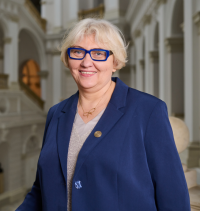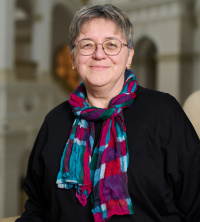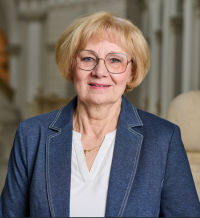Doctoral School Authorities
The Director of the Doctoral School:
| dr hab. inż. Aneta Pobudkowska-Mirecka, prof. uczelni dyrektor.sd@pw.edu.pl Consultation hours with doctoral students:
only cases that do not require access to the student’s files, to schedule a meeting please contact dyrektor.sd@pw.edu.pl; |
|
Deputy director of the Doctoral School;
Head of the Admissions Committee:
| rekrutacja.sd@pw.edu.pl Consultation hours with doctoral students:
|
|
Head of the Science Committee:
| dr hab. inż. Anna Kosieradzka, prof. uczelni nauka.sd@pw.edu.pl Consultation hours with doctoral students:
|
|
Head of the Education Committee:
| dr hab. inż. Jan Król, prof. uczelni ksztalcenie.sd@pw.edu.pl Consultation hours with doctoral students:
after making an appointmentvia ksztalcenie.sd@pw.edu.pl In response to the e-mail you will get information on the exact date of your meeting and the link to the meeting. Consultations are held in order of applications. Please be patient, because the queue may be really long. |
|
Information about the Doctoral School
Doctoral School of the Warsaw University of Technology was established by Order 120/2021 of the Rector on December 14, 2021. From October 1, 2022 it took over PhD students and all the responsibilities of the previous 5 schools existing form April 15, 2019 to October 30, 2022. They, in turn, continued the long-term tradition of doctoral studies previously led by the Faculties of the University.
The Doctoral School is managed by the Director and the School Council, which is chaired by the Director. It consists of 14 representatives of the scientific disciplines represented in the School, 20 representatives of the Faculties, 8 representatives of the Doctoral Council and three chairmen of the Council's permanent committees.
At the moment 15 disciplines from 3 fields of study are represented at the Doctoral School:
- chemical engineering;
- materials engineering;
- chemical sciences;
- physical sciences;
- law;
- mechanical engineering;
- biomedical engineering;
- biotechnology;
- automation, electronics, electrical engineering and space technologies;
- management and quality studies;
- mathematics;
- information and communication technology;
- environmental engineering, mining and energy;
- architecture and urban planning;
- civil engineering and transport.
Doctoral School handles all issues related to the education of PhD students, i.e. admissions, education (including educational offer, verification of the learning outcomes and semester registration), as well as mid-term evaluation (including appointing the mid-term evaluation commissions). The School also leads and participates in implementing projects related to doctoral education. The School closely cooperates with the Centre for International Cooperation, Center for Advanced Studies and other units of the University.
Education is based on interdisciplinarity and creativity of our PhD students. We particularly support internationalization by the wide offer of courses in English, as well as backing (also by additional scholarships) trips abroad, including the project of internationalization of the doctoral schools financed by NAWA within a project PROM. A significant part of our PhD students are foreign students and these realizing the Implementation doctorate program.
Functioning of the School is supported by the School’s Office and PhD students Office and supervised by the Vice-Rector for Scientific Affairs.



